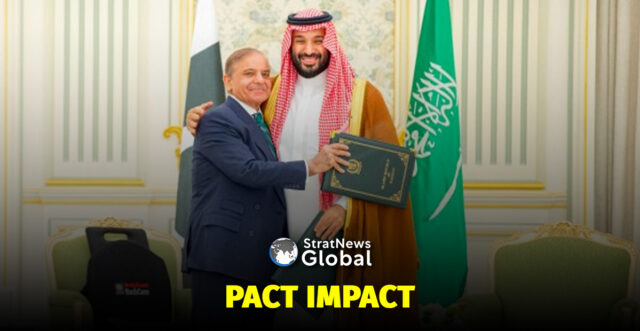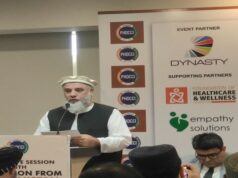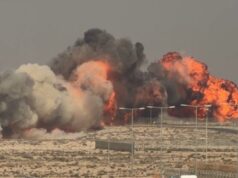In the wake of Israeli attacks on Qatar last week, Saudi Arabia has revived its decades-old defence pact with Pakistan, adding a nuclear dimension this time—a move that has sparked concern across the region, including in India.
India is taking “calibrated steps,” with the Ministry of External Affairs on Thursday saying the government is studying the implications for national security as well as for regional and global stability, StratNewsGlobal has learnt.
The agreement’s immediate objective is to counter Israel’s military actions in the Gulf after the strikes on Doha. Its NATO-style wording—“any aggression against either country shall be considered an aggression against both”—has unsettled the region, raising concerns in India’s strategic circles, according to top-level sources.
Sources said India is closely watching the “Strategic Mutual Defence Agreement” signed Thursday between Riyadh and Islamabad, particularly since it leaves the door open for other countries to join—a prospect that could attract China.
India is therefore assessing how and under what circumstances the pact might be activated and what countermeasures may be needed. New Delhi maintains strong strategic ties with each of the six GCC nations: Saudi Arabia, the UAE, Bahrain, Oman, Qatar and Kuwait.
Ausaf Sayeed, India’s envoy to Riyadh from April 2019 to March 2022, said, “Israel has crossed a red line by attacking Qatar. Attacking a GCC country is a no-go zone. Therefore, this has created a panic. Traditionally, the security order in West Asia is typically anchored by the US and its alliances since the post-World War II era.
“But in recent times we are seeing there is continuous Israeli aggression, and it has exposed the vulnerability of the existing order and has also put a question mark on the US’ role as a security provider to the GCC. This has forced the regional players to look for other alternatives and towards multipolarity for deterrence and stability. This is the larger context of the pact,” he added.
Sayeed noted that Riyadh and Islamabad’s military alliance goes back decades, with Pakistan providing troops during times of regional conflict.
“This has now become a treaty-level understanding, thereby changing the dimension, as nuclear cooperation has now been added to the GCC security setup. This is where India’s security interests come into question,” he said.
While the pact speaks of “joint deterrence against any aggression”, a senior Saudi official stressed it was “not a response to specific countries or specific events.”
Sources also pointed out that India shares a strategic partnership with Saudi Arabia, and Riyadh would not allow Islamabad to use the defence pact against New Delhi.
“It will be incorrect on our part to think that if there is an Operation Sindoor-like incident tomorrow again between India and Pakistan, Riyadh will take Islamabad’s side. The Saudis will never let that happen,” said Sayeed.
Pakistan continues to keep nearly 20,000 troops in Saudi Arabia. In 2017, former Pakistan Army chief Raheel Sharif was appointed by Riyadh to head the Islamic Military Alliance to Fight Terrorism (IMAFT).
The military partnership dates back to the 1980s when Pakistan deployed 15,000 troops during the Iran-Iraq war to bolster Saudi security. Over the years, Saudi cadets have also trained at Pakistani military academies, further deepening the defence relationship.
During Prime Minister Narendra Modi’s visit to Riyadh in April this year, both sides pledged to deepen defence ties and hailed the creation of a Ministerial Committee on Defence Cooperation. India and Saudi Arabia held their first-ever land forces exercise, ‘Sada Tanseeq-I’, in Rajasthan in 2024. Earlier that year, the Saudi Naval Forces Chief of Staff visited India. Bilateral naval exercises ‘Al Mohed Al Hindi’ were held in 2021 and 2023.
“The larger concern for India will be if China or Turkey enters the agreement,” said veteran diplomat Talmiz Ahmad, India’s ambassador to Saudi Arabia from 2000–03 and again in 2010–11.
“This time Pakistan and Saudi Arabia have gone in for a deeper understanding that will have long-term strategic significance. Turkey and China both have shown interest in playing the role of a security player in the region, but not India, and that can become problematic for us. India needs to become more active in the politics of West Asia, else the space will get filled by China and others,” he said.
“India’s engagement with Saudi Arabia and the GCC at large had been overwhelmingly economical, whereas for Pakistan it has been overwhelmingly about defence. The Saudis regard Pakistan’s armed forces as a credible force. They now see Israel as a military hegemon, which has tacit support from its ally – the United States,” Ahmad added.
The timing of the defence pact, coming just months after India’s ‘Operation Sindoor’ against Pakistan, has raised eyebrows within the Indian security establishment, which believes New Delhi may need to devise a counterplan.
Iran’s position is also being closely watched.
According to Nitin Gokhale, Editor-in-Chief of StratNews Global, “Pakistan may have created an unwanted ‘neighbourhood problem’ for itself with Iran by signing the pact. Tehran would not be happy with Riyadh’s increased military and nuclear preparedness with Islamabad’s assistance.”
Also, “Iran’s long-term objective is to wean the Saudis away from the US. So, while the whole of Tehran may not be happy with the Pak-Saudi compact, some sections would be pleased with the Saudis displaying their lack of faith in Washington D.C.,” he added.





